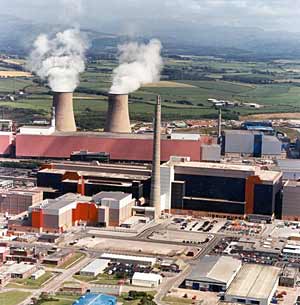
From Ukraine peace plans to Kazakh uranium—all that and more in our new nuclear digest
Our November Nuclear Digest by Bellona’s Environmental Transparency Center is out now. Here’s a quick taste of just three nuclear issues arising in U...
News

Publish date: June 11, 2004
Written by: Erik Martiniussen
News
BNFL announced in a Thursday statement that it was posting a loss of £303m for fiscal year 2003-2004up £42m from fiscal year 2002-2003s posted loss of £261m. Of the £303m loss for 2003-2004, the largest expense£142mcame from running the groups five oldest Magnox nuclear power stations, all of which are due to close by 2010.
BNFL also blames its loss on start-up costs at the controversial mixed plutonium and uranium oxide, or MOX, fuel manufacturing plant at the Sellafield industrial complex, as well as rising nuclear clean-up costs.
Biggest Challenges
In yesterdays statement, BNFL Group Chief Executive Michael Parker said: The period since last summer has been one of the most challenging in BNFLs history. The loss sustained by the Group in 2003-2004 is disappointing, but the financial position will change dramatically once the Nuclear Decommissioning Authority (NDA) takes responsibility for a significant portion of our assets and liabilities as well as the legacy issues.
The total loss for BNFL the previous year was £1.09bn after exceptional charges of £827m, including £415m of extra provisions to cover future decommissioning costs. The scale of the last years deficits explains why the government of the United Kingdom has decided to take over the group’s nuclear decommissioning liabilities.
Next April the NDA will be established as a separate body to provide overall management of clean up at nuclear sites in the UK. More than 40 nuclear reactors have been in operation in the UK, and it is the future decommissioning and clean-up work at these sites, including Sellafield, that the NDA will take charge of.
BNFL has thus established a new stand-alone company to bid for British and international decommissioning contracts, a market estimated to be worth about £3billion a year.
Weve jointly reviewed our strategy with our shareholder (Her Majestys Government) and welcome the chance to operate in the new competitive UK clean-up marketplace, Parker said in the statement.
Westinghouse, the BNFL group’s US nuclear reactor designer and builder, will also be run as a stand-alone company. This will leave it free to be sold, or floated, if the government decides it does not want to retain nuclear construction capacity.
Parker, though, denies that there are plans to sell or float Westinghouse, which last year made a profit of £95million on sales of £1.05billion.
MOX-headache
The prestigious Sellafield MOX Plant, or SMP, is still, however, a headache for the giant state-owned nuclear firm. More than two years after it was commissioned the SMP has yet to produce a single fuel assembly of MOX fuel.
This year BNFL was forced to buy MOX from Belgian nuclear company Belgonucléaire to meet a Swiss contract. John Edwards, finance director at BNFL, told The Guardian today that purchases from Belgonucléaire and increased equipment spending on the £437m MOX plant had cost BNFL tens of millions.
The THORP reprocessing plant at Sellafield has also been highlighted the last three years for a bad performance. Repeated delays in the reprocessing activities at THORP have represented a lasting annoyance to BNFLs customers. Last year THORP handled 671 tonnes of spent nuclear fuel compared with 502 tonnes in 2002-2003. Thats an improvement, but the facility is supposed to handle much more if BNFL is to reach customer targets.

Our November Nuclear Digest by Bellona’s Environmental Transparency Center is out now. Here’s a quick taste of just three nuclear issues arising in U...

For three years now, Bellona has continued its work in exile from Vilnius, sustaining and expanding its analysis despite war, repression, and the collapse of international cooperation with Russia in the environmental and nuclear fields

The Board of the Bellona Foundation has appointed former Minister of Climate and the Environment Sveinung Rotevatn as Managing Director of Bellona No...

Økokrim, Norway’s authority for investigating and prosecuting economic and environmental crime, has imposed a record fine on Equinor following a comp...